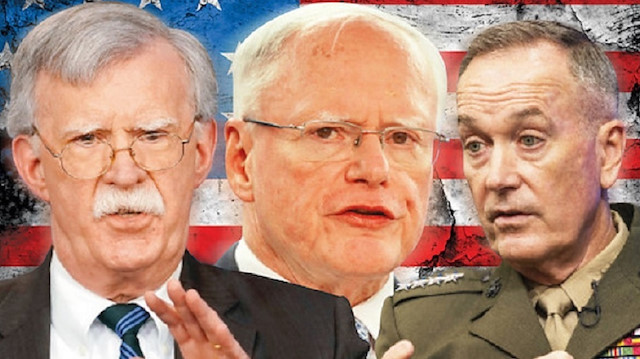
U.S. President Donald Trump’s national security adviser John Bolton has arrived in Ankara with a color-coded map of Syria, dubbed as a new “Sykes-Picot,” put together by new U.S. Special Representative James Jeffery, according to a report by the Wall Street Journal.
The color-coded map is said to have regions highlighted as zones where Turkish soldiers are “prohibited” from entering, in order to “share control” with “Kurds” in northern Syria.
“Mr. Jeffrey and his State Department team have created a color-coded map of northeastern Syria in an attempt to negotiate a power-sharing plan that could avert a costly Turkish-Kurdish fight in the area,” the article stated.
A former U.S. official described the map as “Sykes-Picot on acid.”
Signed in 1916, the Sykes-Picot Agreement laid out British and French spheres of influence in the Near East following the collapse of the Ottoman Empire during World War I.
The secret talks that led to the agreement – held between French diplomat Francois Georges-Picot and the U.K.’s Mark Sykes – were soon revealed by the communists after they took power in Russia in 1917.
Under the pact, the Fertile Crescent was carved up between the two European powers, with Syria and Lebanon falling to France while historical Palestine (including what is now Jordan) went to Britain.
Iraq was divided between the two powers, with Baghdad and Basra going to Britain and Mosul going to France.
White House national security adviser John Bolton on Sunday said that the U.S. withdrawal from Syria relied on Turkey agreeing to protect the United States' “Kurdish” allies, actually referring to Kurdistan Workers’ Party (PKK) terrorists.
The PKK is listed as a terrorist organization by Turkey, the European Union and the United States. The YPG and PYD are its Syrian extensions.
John Bolton, briefing reporters during a visit to Israel, added that Trump "wants the ISIS caliphate destroyed," a reference to Daesh terrorists in Syria.
A possible mission east of the Euphrates, which Turkey’s leadership has been suggesting for months, would follow two successful cross-border Turkish operations into Syria since 2016 – Operation Euphrates Shield and Operation Olive Branch – both meant to eradicate the presence of YPG/PKK and Daesh terrorists near Turkey’s borders.
The PKK is listed as a terrorist organization by Turkey, the European Union and the United States. The YPG and PYD are its Syrian extensions.
U.S. National Security Adviser John Bolton arrived from Israel in Turkey on Monday, as the U.S. begins its withdrawal of military forces from Syria.
Bolton said he would discuss security issues within the region, as well as next steps in the fight against Daesh as the U.S. leaves the area.
"We will discuss our continued work confronting security challenges facing allies and partners in the region, including the next phase of the fight against ISIS, as the U.S. begins to bring troops home from Syria," Bolton said on Twitter, using another name for the Daesh terrorist group.
In a surprising move, U.S. President Donald Trump on Dec. 19 announced the withdrawal of 2,000 troops from Syria. Trump made the decision during a phone call with Turkish President Recep Tayyip Erdogan.















